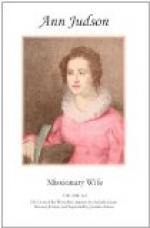From all the accounts which we have of her, Sarah must have been a most engaging child. Gentle and affectionate in disposition, and persuasive and winning in manners, there was yet an ardor and enthusiasm in her character, combined with a quiet firmness and perseverance, that ensured success in whatever she attempted, and gave promise of the lofty excellence to which she afterwards attained. All who have sketched her character notice one peculiarity—and it is one which commonly attends high merit—her modest unobtrusiveness.
She was very fond of little children, and easily won their affections; but showed little disposition even in childhood, to mingle in the sports of those of her own age. This arose from no want of cheerfulness in her bosom; but from a certain thoughtfulness, and fondness for intellectual exercises which were early developed in her character.
Her principle, as well as her fondness for her mother, led her never to shrink from what are termed domestic duties, but her heart was not in them as it was in study and meditation. An illustration of this trait was recently related by her brother. Sarah was repeating some lines on the death of Nancy Cornelius, which attracted the attention of her mother, who asked her where she had learned them. With some hesitation the child confessed that she had composed them the day before, while engaged in some domestic avocation, during which her unusual abstracedness had been noticed. Her early poetical attempts evince uncommon facility in versification; and talent, that if cultivated might have placed her high in the ranks of those who have trod the flowery paths of literature; but hers was a higher vocation; and poetry, which was the delightful recreation of her childhood, and never utterly neglected in her riper years, was never to her anything more than a recreation.
Her effusions at the age of thirteen are truly remarkable, when we consider the circumstances under which they were written. One, which is given by her biographer as it was probably amended by the ’cultivated taste of later years,’ now lies before me as it was first written; and the improved copy, though greatly superior in beauty to the first, seems to me to lack the vigor and energy, which more than atone for the many blemishes of the other. Our readers shall judge. We insert the childish composition; the other is to be found in her graceful memoir by ‘Fanny Forrester.’ She calls it “a Versification of David’s lament over Saul and Jonathan.”




